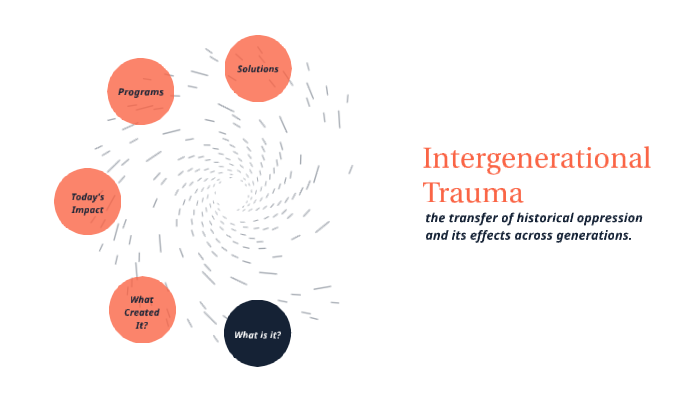

Therapy can feel intimidating, but psychotherapy can provide a safe, confidential space for you to explore the experience of trauma.
#Generational trauma professional#
Seek professional mental health support.Here are some ways to start addressing and healing psychological trauma: Living with trauma can feel overwhelming, but it's possible to overcome the psychological effects of trauma and move forward. How can you heal from intergenerational trauma? The symptoms of unresolved trauma can lead to addictive behaviors (i.e, substance abuse), an inability to deal with conflict, psychological distress, low self-esteem, and other mental health issues. If trauma is left unresolved, the strategies that family members use to "cope" with intergenerational trauma can set a precedent for future generations. “It wasn’t that bad,” or “It could have been worse,” or “Other people had it so much harder though,” are all examples of minimization.Minimization: A grandparent might ignore the impact of trauma or make the traumatic experience smaller than it really is.Dissociation or other types of emotional numbing can also contribute to denial.Denial: A grandparent who refused to acknowledge the impact of their own trauma may teach their grandchildren (intentionally or unintentionally) to ignore the impact of a traumatic event.Unfortunately, many trauma survivors fail to properly address their trauma, and family members often "cope" with intergenerational trauma using two unhealthy coping mechanisms: Ultimately, these wounds can affect how an individual perceives and treats themselves-and these impacts can spill into relationships with friends, family members, and others.

When an individual's emotional and mental health are compromised and they "suck it up" without resolving the trauma, the wounds continue to fester. If left unchecked, generational trauma can take a serious toll on long-term relationship-building behaviors.

#Generational trauma how to#
Studies show that children mimic their parents' behaviors, and they learn how to cultivate relationships and attachment styles based on their parents' modeling. How does intergenerational trauma affect relationships?Ĭhildren experience the world through the eyes of their caregivers. With that said, intergenerational trauma can affect anyone, and recognizing the signs of complex trauma can help families move forward. Intergenerational trauma and historical trauma are also prevalent across other ethnic groups, including indigenous populations in North America and Australia, and Black communities in the United States. In a 1988 study, researchers found that grandchildren of Holocaust survivors were overrepresented in psychiatric referrals by 300 percent. Intergenerational trauma was initially identified among children of Holocaust survivors. Other times, it can involve collective trauma affecting a larger community or ethnic, cultural, or racial group (also known as historical trauma). Sometimes, intergenerational trauma might begin with one individual family member’s traumatic experience. It involves the transmission (or sending down to subsequent generations) of the traumatic effects of an event. Intergenerational trauma describes consistent and persistent years of traumatic challenges within families across generations. The first step to breaking the cycle is to acknowledge your trauma and understand its effects on your identity, relationships, and mental health. Whether you're coping with the effects of intergenerational trauma or living with post traumatic stress disorder (PTSD) or both, you're far from alone. In some families, poor parenting and unsupportive family relationships that are seen as normal patterns can repeatedly cause damage to multiple generations. Multiple factors contribute to this, from an increased vulnerability to mental illness, repeated patterns of neglectful behavior, sexual abuse, substance use, and other unhealthy behaviors. If left unchecked, unresolved trauma can be passed down through generations. Just like a wound to your physical body, psychological injuries require care and attention to properly heal. Sometimes, traumatic experiences can overwhelm our ability to cope, leaving us with emotional wounds or psychological distress.


 0 kommentar(er)
0 kommentar(er)
